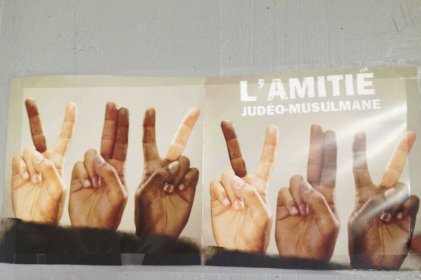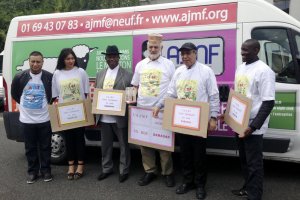Rabbi Michel Serfaty drives to his first appointment of the day, in a suburb south of Paris, just a couple miles from the notorious housing project where gunman Amedy Coulibaly grew up.
Coulibaly is the self-proclaimed Islamist radical who killed a police officer and later four people in a Kosher market in Paris terrorist attacks in January.
France has Europe’s largest Muslim and Jewish communities. For the last decade Serfaty and his team have been working in bleak places like this, trying to promote understanding between the two populations.
Serfaty is still going to the same places since the attacks, but there’s now a team of undercover police officers who accompany him everywhere. Still, The rabbi says he’s more determined than ever.
“These are difficult times for France and especially for French Jews,” he says. “But if anything, we realize our work is even more important.”
The rabbi makes his way into a community center where his French Jewish Muslim Friendship Association has a stand at a local job fair. Serfaty hopes to recruit several more young people to help with community outreach in the largely Muslim, immigrant communities where most people have never even met a Jewish person.

A poster for the French Jewish Muslim Friendship Association, which works in many poor, immigrant neighborhoods.
Eleanor Beardsley/NPR
“In these places they often have specific ideas about Jews,” says Serfaty. “And if they’re negative, we bring arguments and try to open people’s eyes to what are prejudices and negative stereotypes. We try to show children, mothers and teenagers that being Muslim is great, but if they don’t know any Jews, well this is how they are, and they’re also respectable citizens.”
Serfaty says people need to realize they must all work together to build France’s future.
The rabbi takes advantage of funding from a government program that helps youths without work experience find their first job. Serfaty takes them on for a period of three years, giving them valuable training in mediation and community relations. Serfaty’s recruits also study Judaism and Islam. And he takes them on a trip to Auschwitz, the Nazi concentration camp.
The rabbi takes advantage of funding from a government program that helps youths without work experience find their first job. Serfaty takes them on for a period of three years, giving them valuable training in mediation and community relations. Serfaty’s recruits also study Judaism and Islam. And he takes them on a trip to Auschwitz, the Nazi concentration camp.
Serfaty is looking to hire three or four new people. With his affable manner and easy laugh, the job interviews are more like a friendly conversation. He needs Muslim employees for his work, but French laws on secularism forbid him from asking applicants about their religion. So Serfaty draws out the candidates’ views and beliefs in discussion — and through provocative questions.


Pingback: For A French Rabbi And His Muslim Team, There’s Work To Be Done | Eseaf()